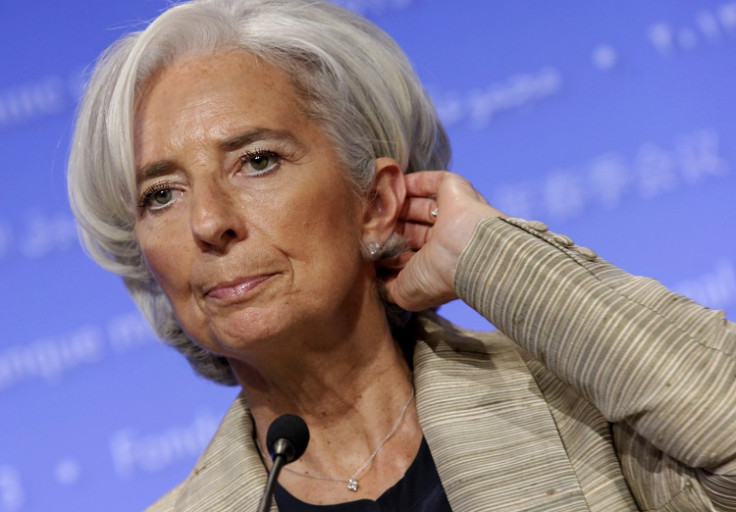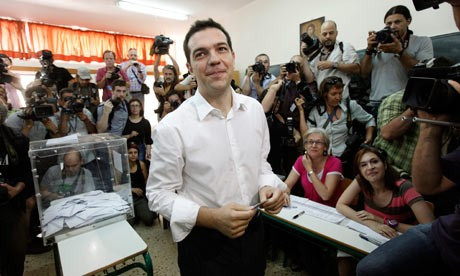Margareta Pagano: Beware of Greek politicians Alexis Tsipras and Antonis Samaras bearing gifts
Hercules is a brilliant young Greek artist – he has two degrees in fine art and is a master iconographer, having restored many of the finest Greek icons in the country's orthodox churches.
Right now, Hercules is rubbing down the chilly window frames in our Essex living room ready for painting because he can't find work at home in Greece, either as an art teacher or restorer. His plan is to stay a few weeks to earn enough to give him a cushion when he returns home to keep searching for work. Here in the UK, the 36-year-old earns more than the €50 (£39) a day he would decorating Greek homes rather than churches – if, indeed, he could find the work.
Like most of the Greek ancients, Hercules is a sceptic; his coffee breaks have already become a daily fix for us too, or to put it more appropriately, an agora.

For hearing his views on the likely outcome of this month's cliff-hanging elections or why the Greeks must stop using the excuse of being chained to the walls like the men in Plato's Allegory of the Cave is gripping stuff.
Remember, this is the story narrated by Socrates, who described how most men are chained to the walls watching the shadows of the priests and politicians passing in front of them - and who are pulling the wool over their eyes.
As Hercules says, Greece has had shedloads of Socrates over the years warning them about shadowy politicians but no one has ever listened. Now the Greeks have to stand up for themselves and stop letting the politicians pull the wool over their eyes.
For him, the politicians of left and right are traitors and as corrupt as each other, while it's the wealthy ship owners and businessmen and women who have robbed the country by not paying their taxes and created the mountain of debt that must now be repaid.
Not surprisingly, he finds our media reports that all Greeks don't pay taxes deeply offensive and the stuff of myths; he has always paid tax, so has his father and everyone he knows; it's the very rich who don't as Christine Lagarde's infamous list of the 2,000 Greeks with Swiss bank accounts at HSBC so vividly displayed.
Hercules reckons the fresh rumours of a Grexit – being floated again in Germany – is another game being played by the country's richest expat businessmen, who see the opportunity of diving back into the country to buy up assets on the cheap. If there were an overnight Grexit and a sharp devaluation, a house worth €30,000 could be gone in a few hours for next to nothing. Once again, the rich would win and the poor lose out.
Russia and Greece appear to be in tandem
Indeed, what's happening now in Greece has many parallels with Russia, where the ruble is falling so fast, it could be an opportune time for oligarchs such as Chelsea FC owner Roman Abramovich to be piling back into the country – most of Moscow's biggest companies could be bought for the price of Lionel Messi's left foot. Does Europe want its bankrupt countries being sold to their expats for peanuts? No, of course not.
Yet what irritates Hercules even more is the absence of any punishment for the political elite – and their rich business friends overseas and bankers at Goldman Sachs – for having brought the country to its knees. What Greece needs most, he says, is a fiercely independent judiciary – run by a new lawmaker like a Solon, the philosopher credited with laying the ground for Athenian democracy.
He doesn't think much of Alexis Tsipras, the lively leader of left-wing party Syriza – and the main challenger to Prime Minister Antonis Samaras and his centre-right New Democracy party – who is edging ahead in the polls for the election on 25 January.

Surely Syriza has Solon-style justice at heart? That's what we hear here in the West as Tsipras and his party has made writing off Greece's debt – at least by half, like the Germans were able to do in 1953 – and cancelling the austerity measures agreed in exchange for funds from the European Union and the International Monetary Fund, its Holy Grail.
It's why the EU and Germany are so nervous of the 40-year-old state-educated, so-called radical engineer.
But Hercules is sceptical of the new left too. He fears Syriza is stuffed with so many of the old Pasok crony politicians that even if Tsipras wanted to, he would be unable to drive through the necessary reforms. At the same time, he fears the EU and Germany even more, quoting Ukip leader Nigel Farage's attack on Samaras for surrendering sovereignity in the European parliament last year as the most honest critique yet levelled against the Greek elite.
There's another big fallacy that clouds judgments, he says: that his country has only olive oil, shipping and tourism to sell. That's not the reality. Greece has oil deposits in the Aegean, big gold mines in the north and enough sun to power every house and industry in the country. And, if new investment were to be forthcoming, there is huge potential for the working man and woman to exploit its tourism and rich agricultural land even more. But that would take stability - and government support.
Plus its young are highly educated and energetic. Tragically, they are leaving the country fast - nearly a million young men and women have left Greece since the financial crash in 2008 in search of work elsewhere: a new diaspora in the making.
Like Hercules, most of them have good minds, great charisma and don't want to leave: they love the smells, the colours and the history of their country too much. For now, they don't have much of a choice; live on the bread line at home or paint homes in Essex.
Margareta Pagano is a business journalist who writes for the Independent and the Financial News. Follow her on Twitter @maggiepagano.
© Copyright IBTimes 2025. All rights reserved.






















